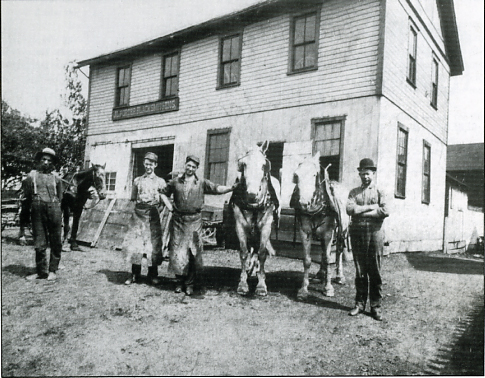
The blacksmith shop of James L. Porter as it appeared sometime after the 1890s in Fairview.
Click Here to Return to Milestones
James L. Porter, blacksmith, is the son of Robert and Eliza (Loyd) Porter and was born in Unionville, Beaver County, in February, 1854. His parents were natives of Allegheny County, his mother having been born in McKeesport; and his grandfathers on both sides were natives of Ireland. James attended the home school at Unionville, and also one in Stewart County, Tenn. At the age of sixteen years he began learning the blacksmith's trade, and in 1876 opened a shop at Black Hawk post office, where he remained for 12 years. He then opened a shop at East Liverpool, Ohio, and after sixteen months moved to Fairview, his present location. He married December 16, 1877, Katharine McFarland, daughter of Benjamin and Mary (Donovan) McFarland, who was born March 26, 1858, in South Beaver Township. Two children have blessed this union, Edwin B. and Clyde A. both of whom are at home. Mr. and Mrs. Porter are members of the Presbyterian Church.----Warner's 1880 History of Beaver County Pennsylvania

Many years ago the blacksmith was a very important person in the
community. He was usually a man of high standing in his village
or town and a person of some importance not only because of his
skill as a craftsman but because he provided a very vital service
to the citizens in the area in which his blacksmith shop was located.
Such a man must have been James Porter,
who conducted a blacksmith shop for many years in the Fairview
area of the present day Ohioville Borough.
The observations made here were possible through the kindness
of Mrs. John Dawson, whose father was Clyde Porter, the son of
James Porter, whose account books were discovered stored away
in the attic of her mother's home. Mrs. Dawson stated that she
can't remember her father having any account books, so all of
the old books apparently are from the Blacksmith Shop that was
located in Fairview.
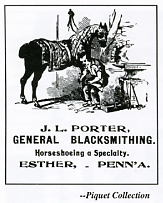
There seem to be a variety of addresses
for the Porter Blacksmith shop; however, it is believed that the
manner in which the mail was delivered was the only change and
not the location of the shop. The mail address was Esther, Pennsylvania,
then Fairview, followed by Smiths Ferry, but no matter what the
name of the post office may have been, the mail still went to
the shop in Fairview.
The duties and tasks performed by the blacksmith were quite varied.
Anything made of metal, if it wasn't made at the blacksmith shop
to begin with, sooner or later made a trip there either for repair
or eventually to be sold or traded in for scrap. The scrap pile
of the blacksmith was usually a heap for which only a blacksmith
could visualize some future use.
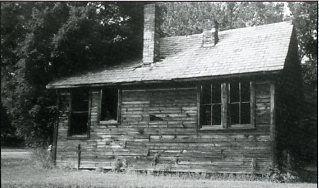
Horse shoeing is the first thing that comes
into our minds when the word blacksmith is mentioned. Truly it
must have been an art in itself to shoe a horse properly and trim
the hooves of those that were brought to him. Removing the shoes
seemed to be a job which the account books record.
But horse shoeing was only one facet of the smith's job. The records
indicate countless items that needed the attention of the blacksmith
to keep the harnesses in repair. There were all sorts of metal
rings, clevis and buckle, bits for the horses. Wagons and buggies,
the chief means of travel and transportation in bygone days, also
frequently needed attention and repairs, be it the axle, singletree,
sometimes the kingpin or strap bolt. New wheels or repairs to
them or new iron tires probably indicate that a broken wheel was
worse than a flat tire on the auto today.
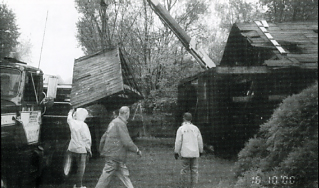
The blacksmith was also the only one who
could make the repairs to wagons and buggies, a service equivalent
to and as necessary as our present day garage mechanic.
The next area of service rendered by the blacksmith was the repairing
of farm implements and machinery. Mr. Porter had accounts of repairing
hay balers, also hooping barrels. In addition, sharpening the
mattocks of the farmers, repairing shovels, and fixing saw handles
are recorded many times in the account books.
A most important part of the oil industry was serviced by Mr.
Porter. Oil production had experienced a boom in the area, after
which it became temporarily dormant, only to be revitalized in
the early 1900s. All sorts of nuts, bolts, and rods were used.
Sometimes these could be repaired, but also new forged parts had
to be made for the numerous oil wells scattered throughout the
area.
In the proper season -- whether for soap making, boiling water
or washing or butchering or perhaps the cooking of apple butter
-- new kettle stands were made.
Other account items included log chains for the Ohio Township
road grader and repairs to the grader itself. Just of what materials
this piece of equipment was made up I don't know, but there were
numerous repairs made on the road grader and some repairs to other
equipment. Bridge bolts were also listed for the township.
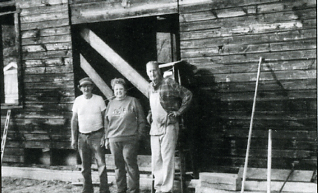
The Porter account books list many items
that are rarely found in today's business accounts. All transactions
were not always paid for with cash.
Credit to one account was made in 1886 for $14.00 for 806 pounds
of iron. Another credit item was 164 pounds of hog at 6 cents
per pound or $9.89.
It is very interesting to see the accounts for shoeing horses
for the Midland Steel Company. Evidently Mr. Porter was the closest
blacksmith in the area when the development of the Midland Steel
Company accounts began in 1905.
At some point, James Porter took the second story off his shop
and moved it to his farm in Ohioville, where it was used as a
blacksmith shop for many years. Clyde Porter, Lester Porter's
son, ran the shop after his father's retirement.
After remaining vacant for fifty years,
it was rescued by the Southside Historical Village Association,
which moved it to Hookstown in October of 2000.
This move occured on the rainy day of October
17, 2000. Instrumental in the move were Betty Brodmerkel, Dr.
Walter Sweeney, Bill Mercer, and other members of the Association.
The roof was cut into four 26 foot-wide
sections and loaded onto truck beds with a crane. The four walls
were then loaded onto trucks and moved to Hookstown.
The Western Pennsylvania Blacksmith Society equipped the shop
and has been conducting classes and demonstrations of blacksmithing.